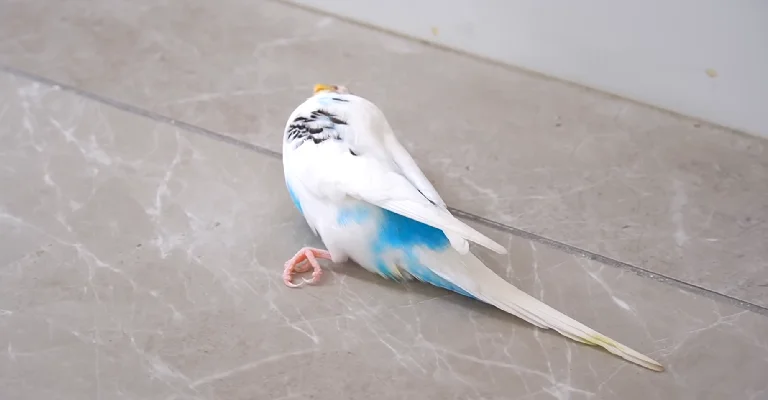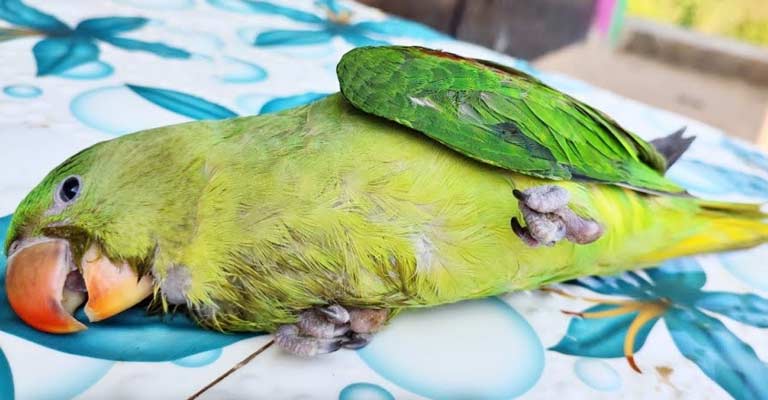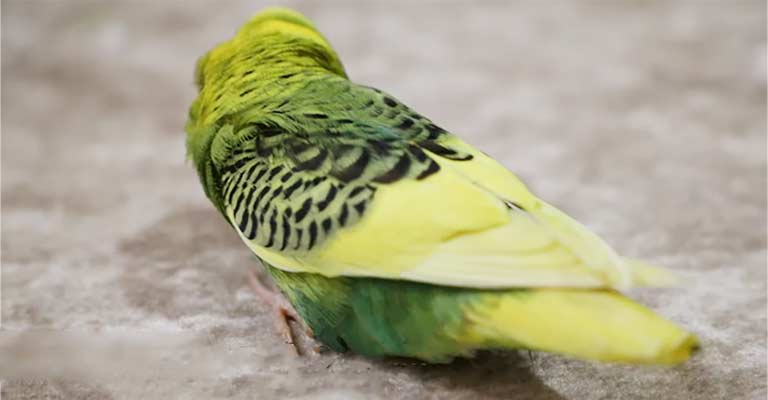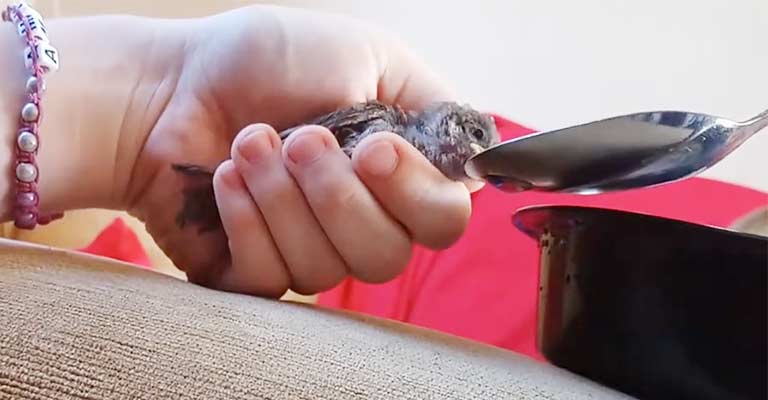The topic of seizures in birds is an important one for bird owners to understand. Seizures can be a sign of a serious underlying medical condition and can have a significant impact on the health and well-being of a bird.
In this blog post, we will explore the causes of seizures in birds, the impact they can have on a bird’s health, and what can be done to prevent and treat them.
Additionally, we will share our personal experience of losing a bird due to a seizure, and how it highlights the importance of understanding this issue.

Causes of Seizures in Birds
Seizures in birds can have various causes, just like in other animals. Seizures are abnormal, uncontrolled electrical activity in the brain, and they can manifest as convulsions, muscle spasms, or other neurological signs.
If you suspect your bird is having seizures, it’s crucial to consult with an avian veterinarian for a proper diagnosis and treatment. Here are some potential causes of seizures in birds:
Medical Conditions:
- Tumors: Brain tumors can cause seizures in birds as they grow and press on the brain.
- Infections: Diseases such as avian influenza and West Nile virus can cause inflammation in the brain, leading to seizures.
- Heatstroke: High temperatures and lack of proper ventilation can cause heatstroke in birds, which can lead to seizures.
- Trauma: Head injuries, such as those caused by falls or collisions, can lead to seizures.
Environmental Stressors:
- Hyperthermia: High temperatures can cause heat stress in birds, leading to seizures.
- Lack of shade and water: Birds need access to shade and water to keep their body temperature regulated. Without it, they can become dehydrated and overheat, leading to seizures.
Nutritional Imbalances
Hypoglycemia: Low blood sugar levels can cause weakness and seizures in birds. This can be caused by a lack of food or an underlying medical condition such as liver disease.
Impact of Seizures on Bird Health

Seizures can have a significant impact on a bird’s health and well-being. Seizures represent abnormal electrical activity in the brain, and their effects can vary depending on the cause, frequency, and duration.
Here are some ways in which seizures can affect a bird’s health:
Effects on Brain Function
Seizures in birds can cause damage to the brain, leading to long-term neurological consequences such as memory loss, disorientation, and difficulty with movement or coordination. The seizures can also cause inflammation and scarring of the brain, which can further impair brain function.
Risk of Death
Seizures can be life-threatening for birds, as they can cause respiratory or cardiac arrest. Birds that experience recurrent seizures are at a higher risk of death.
Importance of Early Diagnosis and Treatment
Early diagnosis and treatment of seizures in birds is critical for preventing further damage to the brain and minimizing the risk of death.
This can include a veterinary examination and diagnostic tests such as blood tests, imaging, and electroencephalography (EEG) to determine the underlying cause of the seizures.
Treatment options may include medications, surgery, or lifestyle changes to manage the underlying medical condition or environmental stressors.
In addition, providing supportive care such as oxygen therapy and fluid therapy can help to stabilize the bird during a seizure.
Prevention of Seizures in Birds

Preventing seizures in birds involves providing a safe and healthy environment, as well as addressing potential underlying causes. While not all seizures can be prevented, following these guidelines can help reduce the risk:
Provide a Balanced Diet
Ensure your bird receives a well-balanced and species-appropriate diet. Consult with an avian veterinarian to determine your bird’s specific dietary needs.
Inadequate nutrition can contribute to seizures, so it’s essential to feed your bird a diet that meets its nutritional requirements.
Avoid Toxins
Keep your bird’s living area free from potential toxins. Common sources of poisoning in birds include lead and zinc from cage accessories, toxic plants, pesticides, and household chemicals. Regularly inspect your bird’s environment and remove any potential hazards.
Regular Veterinary Check-ups
Schedule regular check-ups with an avian veterinarian. Regular veterinary visits can help detect and address health issues before they lead to seizures. Your veterinarian can also provide guidance on your bird’s overall health and well-being.
Minimize Stress
Birds can be sensitive to changes in their environment and stressful situations. Minimize exposure to loud noises, sudden changes, and stressful events. Providing a consistent and enriched living environment can help reduce stress.
Proper Hydration
Ensure your bird has access to clean and fresh water at all times. Dehydration can contribute to health problems, so monitor your bird’s water consumption.
Quarantine New Birds
If you introduce a new bird to your household, quarantine it in a separate area for a few weeks. This helps prevent the spread of infectious diseases that can lead to seizures in birds.
Avoid Overbreeding
If you are a breeder, avoid excessive inbreeding, as this can increase the risk of genetic disorders and neurological issues in offspring.
Exercise and Mental Stimulation
Provide your bird with opportunities for physical activity and mental stimulation. Regular exercise and enrichment can help keep your bird mentally and physically healthy.
Proper Temperature and Lighting
Maintain appropriate temperature and lighting conditions for your bird’s species. Sudden temperature changes or inadequate lighting can stress birds and potentially trigger seizures.
Monitor for Early Signs
Be vigilant and monitor your bird for any unusual behaviors or signs of illness. Early detection of health issues can lead to timely intervention and treatment.
Treatment of Seizures in Birds

Treatment of seizures in birds involves identifying and addressing the underlying cause, managing the immediate seizure episode, and potentially providing long-term management to prevent future seizures. Here are the key steps in the treatment of seizures in birds:
Immediate Care During a Seizure
- Ensure the safety of your bird by removing any potential hazards or objects from its immediate environment.
- Keep the area quiet and dimly lit to reduce stress and sensory stimulation.
- Avoid handling the bird during a seizure, as this can increase stress and the risk of injury.
- Monitor the duration of the seizure, as prolonged seizures may require emergency veterinary intervention.
Consult an Avian Veterinarian
If your bird experiences a seizure, it is essential to consult with an avian veterinarian as soon as possible. Seizures are a symptom of an underlying issue, and a thorough examination and diagnostic tests are needed to determine the cause.
Diagnostic Tests
Your veterinarian will perform various diagnostic tests, including blood tests, imaging (such as radiographs or CT scans), and possibly a cerebrospinal fluid analysis to identify the underlying cause of the seizures.
Treatment of Underlying Cause
Once the underlying cause is identified, your veterinarian will develop a treatment plan to address it.
Treatment may include medications, dietary changes, or specific therapies tailored to the diagnosis. Common underlying causes of seizures in birds include infections, toxins, metabolic disorders, and head trauma.
Anticonvulsant Medications
In some cases, veterinarians may prescribe anticonvulsant medications to help control and reduce the frequency of seizures.
Commonly used medications include phenobarbital and diazepam. It’s essential to follow your veterinarian’s instructions precisely when administering these medications.
Long-Term Management
Depending on the underlying cause, your veterinarian will work with you to develop a long-term management plan. This may involve ongoing medication, dietary modifications, environmental changes, and regular check-ups to monitor your bird’s condition.
Monitoring and Supportive Care
Provide ongoing care and monitoring for your bird. Pay attention to any changes in its behavior, appetite, or overall health, and report these to your veterinarian.
Offer a comfortable and stress-free living environment to minimize potential triggers for seizures.
Compliance with Veterinary Recommendations
Follow your avian veterinarian’s recommendations diligently, including medication administration, dietary changes, and any other specific care instructions.
Common Causes of Seizures in Birds
| Cause | Description |
|---|---|
| Tumors | Tumors in the brain can cause seizures in birds. These tumors can be benign or malignant and can lead to neurological damage. |
| Infections | Certain types of infections, such as those caused by bacteria or viruses, can lead to seizures in birds. These infections can affect the brain and nervous system. |
| Heatstroke | Birds are unable to sweat and release heat through the skin, so they are at risk of overheating and developing heatstroke. Heatstroke can lead to seizures and other neurological symptoms. |
| Trauma | Trauma to the head or brain can cause seizures in birds. This can occur as a result of an injury or accident. |
| Hyperthermia | High temperatures can cause seizures in birds due to the fact that birds are unable to cool themselves. Birds need shade and water to keep cool and prevent seizures. |
| Nutritional imbalances | Nutritional imbalances, such as hypoglycemia, can lead to weakness and seizures in birds. Birds need a balanced diet to maintain their health. |
FAQs
Signs of a seizure in a bird can include sudden movements such as twitching, convulsions, or loss of consciousness. Birds may also appear disoriented or confused during a seizure.
Some bird species may be predisposed to seizures due to genetic factors, but this is not always the case. Environmental stressors and medical conditions are often the primary causes of seizures in birds.
With proper diagnosis and treatment, some birds may recover from seizures, but the potential for long-term neurological damage and risk of death is still present.
While some natural remedies, such as homeopathy, may be used to treat seizures in birds, it is important to consult with a veterinarian before attempting any type of treatment. Medication and supportive care are often the most effective ways to treat seizures in birds.
Seizures can be prevented by providing birds with a healthy diet, environment, and regular veterinary care. Identifying and treating any underlying medical conditions can also help prevent seizures.
Conclusion
the main focus is to bring all the key points together and provide a final takeaway for the readers. The summary should cover the causes of seizures in birds, the impact on their health, and the prevention and treatment options.
The main points that should be summarized in this section include the primary causes of seizures in birds such as tumors, infections, heatstroke, and trauma.
Environmental stressors and nutritional imbalances can also contribute to seizures. The impact of seizures on bird health, including effects on brain function, risk of death, and the importance of early diagnosis and treatment should also be highlighted.
Lastly, the prevention measures that can be taken and treatment options available, including medication and supportive care, and the importance of working with a veterinarian should be summarized.
In this section, readers should be encouraged to take action to prevent seizures in their birds by providing a healthy diet and environment. If they suspect their bird has had a seizure, they should seek veterinary care immediately.
The personal experience of losing a bird due to a seizure should be reflected upon and the importance of understanding seizures and taking preventative measures should be emphasized.
It can also be a good idea to remind readers that seizures are not always fatal and that early diagnosis and treatment can help minimize the impact on bird health.